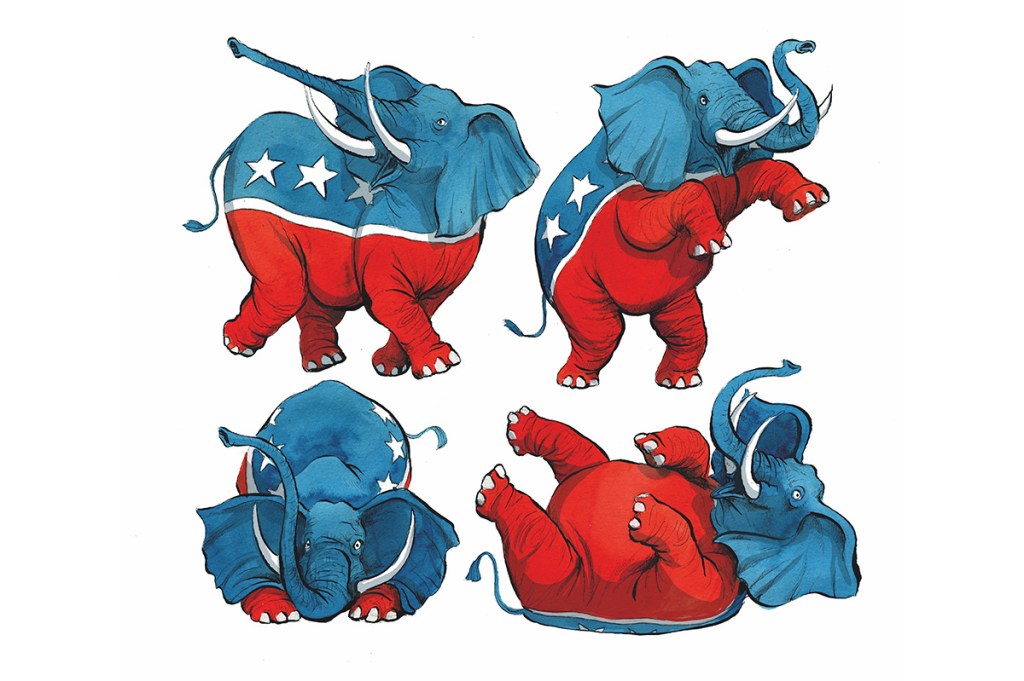The future of the GOP is the same as the future of the Democratic party. That is because the parties are not two things, but (to compare low things with high) somewhat akin to that union described in the Catholic creed: ex patre filioque procedit: ‘it proceeds from the father and the son’, one substance, two faces (well, three, really, but we can leave that to one side).
As I have had occasion to observe elsewhere, the current political disposition of the United States is not a two-party system. It is at most a one-and-a-half party system. There is a regime party, which basically calls the shots. And there is a junior, adjunct party that has different branding but sells mostly the same goods under different labels.
The regime party allows the junior party to win elections every now and again. But the course of the ship of state is determined by the regime, not the junior team. This is not immediately obvious to the Republicans. When they win, they think they are in the driver’s seat. They’ve won, after all. But then they find that their steering wheel has no effect on the vessel’s direction. It turns out that it’s purely cosmetic, like the steering wheels once attached to the front of a child’s car seat. It might look like daddy’s. It might even have a working horn. But it has no effect on the direction of the car.
In the past, I have identified the regime party with the Democrats. I think that was more or less accurate until the 1960s; since then they have provided its face. The overall tendency of our politics, however, has been antecedently determined by what has come to be called the ‘Deep State’ or the ‘administrative state’.
Joe Sobran called it the Hive. Just as in a beehive, Sobran observed, members of the progressive dispensation that populates the ranks of the administrative state feel that they are free, yet their attitudes and behavior are utterly predictable. ‘Liberals laugh at conspiracy theories that assume that because there is a pattern there must be some central control; but the fact that there is no central control doesn’t mean that there is no pattern.’
Sobran is especially good on the honey that coats the Hive’s often unspoken program. ‘By using pragmatic language for its agenda,’ he notes, ‘the Hive misleads the general public about its ultimate goals.’
‘It gains power as ordinary people adopt its language without grasping the implications. After all, who could oppose such worthy causes as “civil rights”, “a woman’s right to choose”, “protecting our children” and “saving the environment”? The news media use the buzzwords of the Hive so habitually that they have become virtual organs of the Hive.’
The regime party is the party of the Hive. The adjacent buzzing that you hear is the sound of what Bill Kristol called ‘decent and elevated conservatism’. It’s the well-pressed, buttoned-down mascot party that emits a certain rhetoric even as, snail-like, it leaves behind an unmistakable smudge. Its rhetoric is full of phrases like ‘free market,’ ‘democracy’ (especially ‘our democracy’), and ‘globalization’. The smudge is sticky and vaguely emetic. Mitt Romney, the Grecian Formula pol, epitomizes the phenomenon, as do former Speaker of the House Paul Ryan and the representative from the State of Georgetown and District of Peggy Noonan, Liz Cheney.
At the end of May, Paul Ryan gave a speech at the Reagan Library. It was much praised by Dems and pajama-boy conservatives. In some ways it was an amazing performance, a Whitmanian performance — ‘Do I contradict myself? / Very well then I contradict myself, / (I am large, I contain multitudes)’. Among other things, the former speaker said that culture and the ‘culture wars’ matter ‘absolutely’ while also demanding that true, genuine, elevated — that is to say, freshly scrubbed and principled conservatives like, well, like Paul Ryan — mustn’t ‘get caught up in every little [it would be little] cultural battle’.
Little battles like the one over requiring schools to teach ‘critical race theory,’ for example, which teaches children to hate themselves, their country, and their heritage.
Voters, according to Ryan, should not heed the siren calls of the pied piper of Mar-a-Lago, to say nothing of ‘second-rate imitators’. Oh no, we elevated conservatives ‘win majorities by directing our loyalty and respect to voters and by staying faithful to the conservative principles that unite us’. Principles, gentlemen!
George Orwell responded to Stalin’s observation that you can’t make an omelet without breaking eggs with the question: ‘Where’s the omelet?’ One wants to ask ex-speaker Paul Ryan, ‘What majorities?’
I think it quite likely that the Republicans will do well in the midterm elections. Indications at this point are that they will win beyond the margin of fraud and take back the House and the Senate. Will it matter? Possibly. But I have my doubts. Winston Churchill once described Clement Attlee as ‘a sheep in sheep’s clothing’. Today, the GOP is heavily populated with aspiring Attlees. There are exceptions, Ron DeSantis, for example. But he and his ilk are beleaguered and marginalized because they are too rough-edged and ‘confrontational’.
To a larger extent than can be generally acknowledged, the leadership of today’s GOP was conceived in weakness and dedicated to the proposition that bureaucracy, aka the Hive, is salvation. In his book The Present Age, Søren Kierkegaard suggested that his age, though ‘revolutionary’, was also feckless: ‘It leaves everything standing but cunningly empties it of significance.’ That’s where the GOP is today.
This article was originally published in The Spectator’s July 2021 World edition.

























